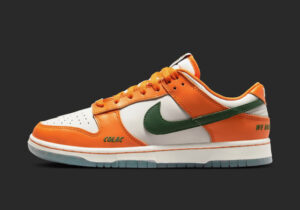
When it was announced that Florida A&M University would be getting another shoe by Nike as a part of their Yardrunners 3.0 collection, many were ecstatic to get their hands on a pair of the FAMU Dunk Lows.
The APB Store had a physical release at their Tallahassee location, but due to the line being extensive, many did not get a chance to buy a pair of the shoes. When Nike announced that online purchases had been released to the public, it was seen as a sign of redemption.
On the day of release however, many students and alumni took to twitter to express their distain.
Bryan Brown, a FAMU alumni, posted a tweet about his failed attempt to receive the Nike sneakers.
“I hate the shoe game these days,” Brown said. “I really wanted those FAMU dunks.”
Nike SNKRS, the app that the dunks were released on, typically encounter reseller problems. Despite trying to restrict resellers overall, this shoe release is just more of the same old story.
Resellers use multiple bots to enter the raffle, giving them a higher chance of getting more pairs of the sneakers, making it a lower percentage for regular consumers.
Many students were upset at the fact that the shoe had been sold to the public and not to the students, faculty, and alumni of the University dedicated to the shoe design.
Maxwell Rolle, a current FAMU student, expressed his frustrations in a tweet, discussing the possibility of non-FAMU individuals wearing or selling a shoe designed for his HBCU.
“Let me find out if somebody who doesn’t even go to FAMU got these dunks,” Rolle said. “There should’ve been a way to enter our FAMU emails.”
Even if the shoes were sold to people with direct connections to the university, there would obviously not be enough for everyone in the student body alone.
Since the drop of the shoes, the prices on resell websites such as StockX and GOAT go from a total of between $250 to $700 depending on the size, making it 2 to 4 times more than the retail price of $120.
Despite having a whole collection of shoes marketed towards black colleges and universities, can the black community really say that these shoes are really being sold to them? In turn, is Nike benefiting regardless at the expense of HBCU designs, to fill the pockets of the corporate company?